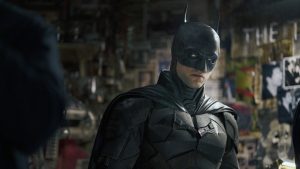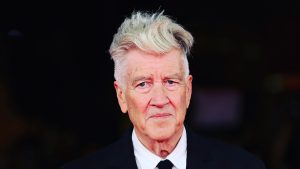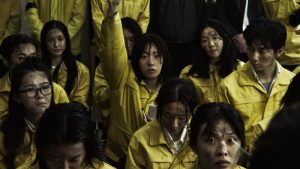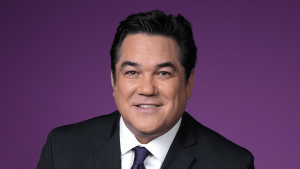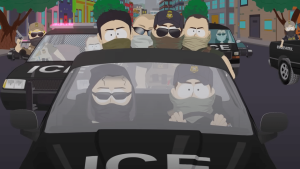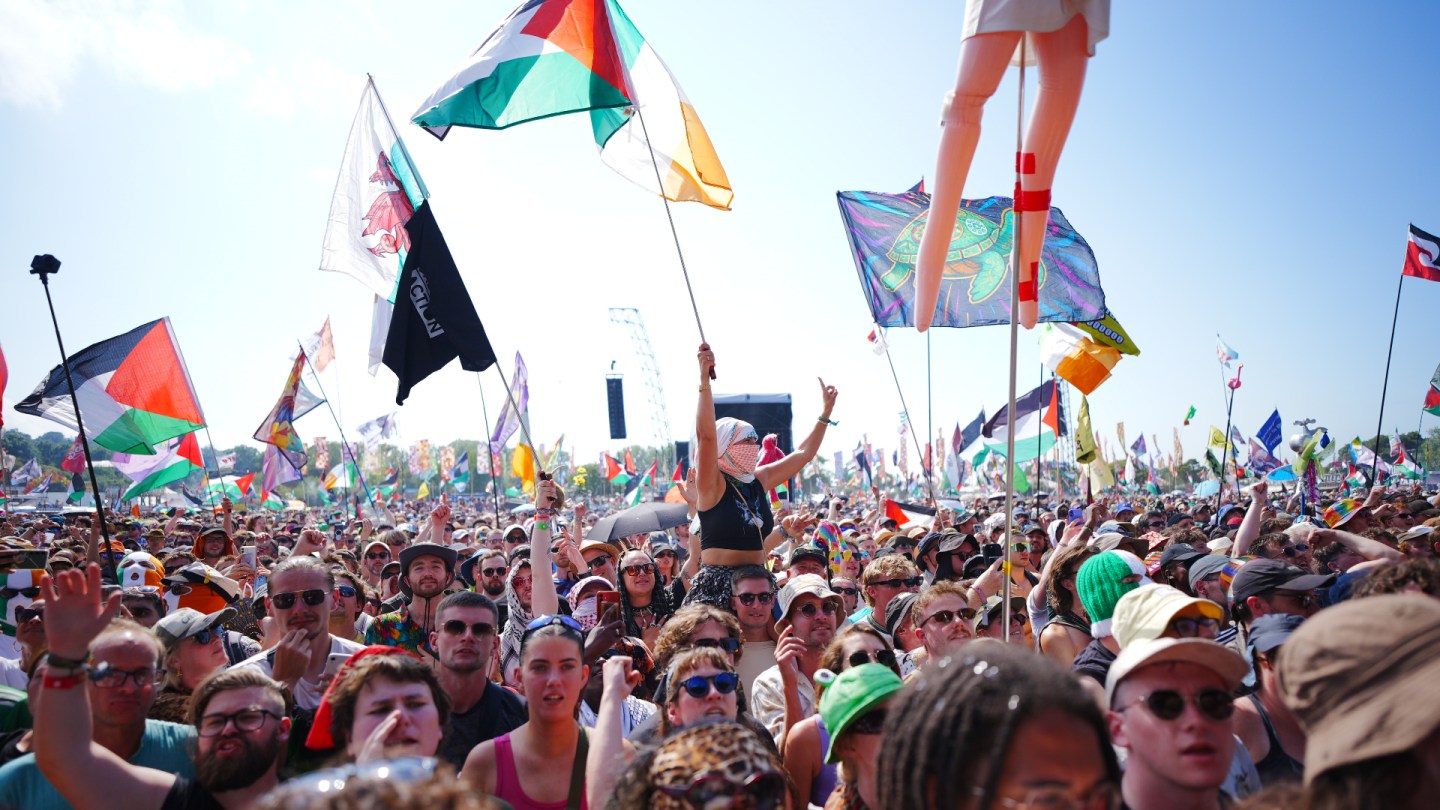
Musical activism is nothing new. Think of Jimi Hendrix protesting the Vietnam War at Woodstock with his distorted, electronic take on the “Star-Spangled Banner.” So it should come as no surprise that the most contentious political issue of our time — the ongoing war in Gaza — is being voiced, debated and fought over on stages at music festivals and in clubs worldwide.
On the festival circuit, artists condemning Israel or calling for a “free Palestine” have become as common as a chorus sing-along. Pop stars — Dua Lipa, Billie Eilish, Lana Del Rey, The Weeknd, Olivia Rodrigo, and many more — regularly take to social media to call attention to the humanitarian crisis in the region. Groups like DJ for Palestine and Ravers for Palestine have injected activism into the club scene.
The pro-Palestinian views espoused by many musical artists appear to be popular with their young, mostly left-wing audiences — the recent Glastonbury Festival was a sea of Palestinian flags — but within the broader music industry, the issue of Gaza, and sharply escalating criticism of Israel, is proving divisive. Bands find themselves at odds with venues, artists at odds with their agencies, and festivals with their corporate owners.
Outspoken acts have had gigs cancelled and travel visas revoked. A few have been brought up on criminal charges. Artists, with the support of activist groups like the pro-Palestinian BDS (Boycott, Divestment and Sanctions) and PACBI (Palestinian Campaign for the Academic and Cultural Boycott of Israel) movements, have blacklisted clubs and festivals for their corporate links, however tenuous, to Israel’s war effort.
The result is a rising tension between political expression and institutional pushback; a clash that has erupted in full view in recent weeks as prominent acts speak out against what they describe as coordinated efforts to silence pro-Palestinian voices in music.
On July 17, British trip hop collective Massive Attack, together with Brian Eno and Irish bands Fontaines DC and Kneecap — a group that has been at the center of a media storm over pro-Palestine and anti-Israel comments made on festival stages in Coachella and Glastonbury — announced the formation of a syndicate to support musical artists who speak out for Palestine and against Israel’s military campaign in Gaza.
Posting on Instagram, the musicians said they were aware of “aggressive, vexatious campaigns” carried out by the political advocacy group U.K. Lawyers for Israel (UKLFI) and of “multiple individual incidences of intimidation within the music industry itself” designed, they said, solely “to censor and silence artists from speaking their hearts and minds.”

Samir Hussein/WireImage
Asked for comment by The Hollywood Reporter, UKLFI said their actions “regarding bands who stir up racial hatred are neither vexatious nor aggressive, but have been taken seriously by the police and venues.“
The post came in the wake of media and legal backlash against Kneecap and British punk-rap group Bob Vylan after their Glastonbury performances.
THR was in the crowd for Kneecap’s June 28 set in front of the West Holts stage on an uncharacteristically sweltering day in England as the Irish hip-hop trio chanted “Free Palestine” and “F**k Keir Starmer,” the latter a reference to the U.K. Prime Minister.
Fans at home weren’t chanting along. U.K. broadcaster the BBC dropped Kneecap from its live coverage of Glastonbury, citing concerns over the band’s previous conduct at Coachella in April, where they displayed slogans — one containing an expletive — accusing Israel of genocide.
But Bob Vylan’s set, which preceded Kneecap’s on the same stage, and included chants of “Death to the IDF,” referring to the Israel Defense Force, was carried live on the BBC and remained online for hours after.
The response was immediate.
The UKLFI reported Bob Vylan frontman, Bobby Vylan (real name Pascal Robinson-Foster), to local police. The charge was violating public order laws by the use of “threatening and abusive words and behavior” likely to stir up racial hatred. The Avon and Somerset police force began investigations into both Bob Vylan and Kneecap. Police dropped the Kneecap case on July 18, citing “insufficient evidence.” The Bob Vylan investigation continues.
The BBC said it “regretted” not pulling the livestream of Bob Vylan’s performance and joined the U.K. government and many Jewish and pro-Israeli groups in branding the band’s statements as anti-Semitic.
“We deeply regret that such offensive and deplorable behavior appeared on the BBC and want to apologize to our viewers and listeners and in particular the Jewish community,” a spokesperson for the channel said. “We are also unequivocal that there can be no place for antisemitism at, or on, the BBC.”
In a separate statement given to The Hollywood Reporter, the BBC added: “We will continue to bring audiences a range of music performances, both live and on-demand, and we respect artists’ freedom of expression. However, Bob Vylan’s offensive and deplorable behavior on one of our Glastonbury live streams was completely unacceptable, and we are sorry it appeared on the BBC. This is why we have made immediate changes to livestreaming music events, and these, alongside our editorial guidelines, will shape our plans going forward.”
The BBC confirmed that Bob Vylan and Kneecap were deemed “high-risk” ahead of their Glastonbury sets, yet were broadcast anyway. The company will now not broadcast any set it views as high-risk in its live music coverage. THR understands this is likely to impact a small number of acts (only five were labelled “high-risk” before Glastonbury).
Amid the post-Glastonbury outcry, talent agency UTA dropped Bob Vylan from its roster. On June 30, the band had their U.S. visas revoked. U.S. Deputy Secretary of State Christopher Landau said the move was “in light of their hateful tirade at Glastonbury, including leading the crowd in death chants.” He added on X that “foreigners who glorify violence and hatred are not welcome visitors to our country.” Bob Vylan was scheduled to open for Canadian-American singer grandson’s U.S. tour this fall.
“We are not for the death of Jews, Arabs or any other race or group of people,” Bob Vylan said in a statement during the uproar. “We are for the dismantling of a violent military machine. We, like those in the spotlight before us, are not the story. We are a distraction from the story, and whatever sanctions we receive will be a distraction.”
Pro-Israel lobby groups, including UKLFI, have put pressure on festivals and venues to cut ties with Kneecap and Bob Vylan. The group said it wrote to venues warning of potential breaches of the law should the duo repeat their chants on other stages.
Under pressure following Glastonbury, Manchester’s Radar Festival dropped Bob Vylan from its headline slot. France’s Kave Festival dis-invited them, and several German venues cancelled their gigs. Eventually, Bob Vylan dropped plans to accompany New York punks Gogol Bordello as a supporting act on their European tour.
More than a dozen festivals across Europe dropped Kneecap following their Coachella performance in April, including Germany’s Hurricane and Southside festivals, Cornwall’s Eden Project, and Scotland’s TRNSMT festival.
“We are aware of three Kneecap concerts being cancelled in response to letters by us and by many local groups, who objected to their performances, given their history of anti-Israel rhetoric,” a spokesperson for UKLFI told The Hollywood Reporter.
After Coachella, UKLFI reported Kneecap lead singer Liam Óg Ó hAnnaidh, known as Mo Chara, to police for a terrorism offense, for allegedly holding up a banned Hezbollah flag during a London gig last November. The 27-year-old rapper, currently out on bail, denies the charges. He is set to appear in court in August. The court case is just one front in a broader battle, as pro-Palestinian artists like Kneecap face pressure not only from legal authorities but also from political leaders and industry insiders.
Numerous politicians and industry figures had opposed Kneecap’s inclusion at Glastonbury. Prime Minister Keir Starmer said it was “not appropriate” that Glastonbury organizers had invited the Irish rap trio to perform. Conservative Party leader Kemi Badenoch said the BBC should not carry the group’s gig, saying it would be “rewarding extremism.”

VALERIE MACON/AFP via Getty Images
The week before the festival, a letter sent to Glastonbury organizer Emily Eavis by “a powerful music agent” and signed by “30 individuals from within the music industry” was leaked to the press by Toddla T, a former BBC 1 Radio DJ and record producer who worked on Kneecap’s 2024 debut album “Fine Art.” The letter, details of which Toddla T posted on Instagram, appeared to urge festival organizers to remove Kneecap from the line-up.
Among the signatories was David Levy, a WME music agent to Bjork, Calvin Harris and Dua Lipa, among others.
Following the revelations, Massive Attack, which had been represented by Levy for 30 years, dropped him as their agent.
“On learning of the actions of our agent, we now feel more secure representing ourselves and our political and ethical positions than we do being represented by others, whose views and methods we fundamentally disagree with,” the band said in a statement.
This isn’t Massive Attack’s first act of activism. The Bristol trip-hop collective, known for chart toppers like “Unfinished Sympathy” and “Teardrop,” has been vocal supporters of the Palestinian cause for decades, and has boycotted performing in Israel since 1999. More recently, they have backed boycotts aimed at the corporate backers of major music festivals.
Ahead of their June 5 show at the Co-op Live arena in Manchester, the group demanded the removal of all branding from sponsor Barclays Bank, which has been targeted by BDS for its financial ties to Israeli companies. A similar boycott by Massive Attack and other artists last year forced Barclays to suspend its sponsorship of all music festivals staged by promoter Live Nation, including the Download, Latitude, tand Isle of Wight fests.
Austin’s 2024 South by Southwest festival (SXSW) was similarly hit when multiple artists, including indie folk singer Squirrel Flower, emo band Proper and singer-songwriter Eliza McLamb, pulled out of gigs in protest of two of the event’s sponsors: Defense contractor Collins Aerospace, a subsidiary of weapons manufacturer RTX Corporation, which supplies weapons to the Israeli military, and the US army. The US army was listed as a “super sponsor” of the 2024 festival, and was slated to present more than nine events. Collins Aerospace sponsored two events at SXSW Pitch, the festival’s tech showcase.
Amid the band boycott, SXSW dropped both sponsors for its 2025 festival.
“After careful consideration, we are revising our sponsorship model,” the festival said in a statement on its website’s FAQ page. “As a result, the US army and companies that engage in weapons manufacturing will not be sponsors of SXSW 2025.”
A recent industry target is Superstruct, an umbrella organization for some 80 festivals and live music events, including Germany’s Parookaville and Wacken festivals, London’s LGBTQ+ fest Mighty Hoopla, Spain’s Sonar, Finland’s Flow, and club platform Boiler Room. When New York-based private equity firm KKR acquired Superstruct last year for $1.4 billion, PACBI, citing KKR’s investments in Israeli firms, called for a boycott of Superstruct festivals.
In an email to THR, a spokesperson for Superstruct said the company, and its festivals, had no interests in Israel. “And even if we did, it’s difficult to see how boycotting us would change the course of the situation in Gaza. All of our festivals are operationally independent of our shareholders.”
But the boycotts have had an impact. Several Superstruct festivals, including Boiler Room, Flow, Mighty Hoopla, and others, have publicly distanced themselves from their parent company to show solidarity with the Palestinian cause.
“We recognize that the world’s highest court, the International Court of Justice, has ruled that Israel is plausibly committing genocide in Gaza and that it is practicing apartheid and occupation against the Palestinian people,” reads the statement, posted on Instagram, by Mighty Hoopla organizers. “Whilst we cannot control agreements or investments made in our parent companies, we wish to stake our clear opposition to KKR’s unethical investments.”
In an email to THR, a PACBI spokesperson said its music industry boycotts “are exacting an increasingly heavy price against complicity in genocide,” thanking the “many artists and organizations who have endorsed the cultural boycott of Israel and of international institutions that are implicated in whitewashing apartheid Israel’s genocide in Gaza.”
Superstruct is part of a booming live music industry, a sector that has become a magnet for investors. According to figures from research group Custom Market Insights, the live music business was worth $38.58 billion this year and is projected to grow to $62.59 billion by 2034. Much of the business is already deeply entwined with financial backers, many of whom, given the global reach of private equity, have investments that activists now consider targets. Live Nation, for example, the world’s leading live entertainment company, is controlled by Liberty Media, a U.S. conglomerate whose venture arm has investments in Israeli firms — a link activists have used to justify boycott calls.
As festivals become flashpoints for political activism, some fear the industry’s gold rush may now be at risk.
“Music has benefited from literally billions of dollars of investment in recent years, much of it in recordings, but also increasingly in the live music space,” noted one senior music industry source. “That investment has been predicated on music being regarded as a non-cyclical safe bet for investors. With big sponsors such as Barclays, promoters like Live Nation and even investors like Blackrock, Vanguard and KKR now a target for activists, there’s a genuine fear that the tap could be turned off. That would hurt not just businesses, but artists and ultimately fans.”
Superstruct says the economic fallout from the boycotts has been “minimal” so far, but warns of the “impact on our staff, artists, and other stakeholders” of the politicization of the Gaza conflict.
“Young festival workers, creatives, and artists are being threatened with career- or even life-changing consequences if they don’t publicly declare their support for one side or the other,” the Superstruct spokesperson says. “In some cases, they share the same views as some of the activists, but we all struggle with the aggressive tactics of the campaign. No doubt many of the activists are well-meaning and are motivated by humanitarian concern, but I question the effectiveness of targeting DJs or artists at a festival. Culture and the arts shouldn’t be the battleground.”
The spokesperson warned that “as the risks become too great,” organizers will begin to “lose staff to other sectors or even lose events.” Whatever the internal divisions within the industry, they say, “We need to get the message across, it’s OK to feel strongly about the issues in the world and still go to your favorite festival.”
For all the high-level disputes over investment and sponsorship, venues and promoters on the ground are grappling with equally volatile decisions. Beyond the boardrooms and festival headliners, the same political tensions are rippling through Europe’s music scene, from underground clubs to open-air summer festivals, where organizers are facing mounting pressure over who they book and what they represent.
Catherine Jackson-Smith, co-founder and manager of Manchester’s Radar Festival, which took place July 4-6, dropped Bob Vylan from the lineup after the band’s Glastonbury performance. But Jackson-Smith came out publicly to clarify that she was “forced” to pull the group after being caught in “one of the most horrendous professional discussions” she’s ever had with the fest’s venue, its co-owners AMG and Live Nation, as well as local authorities.
Jackson-Smith, under legal advice, was unable to provide THR with more detail. Speaking to the 2 Promoters, 1 Pod podcast, she said the decision to drop Bob Vylan was presented as an ultimatum: Either cancel the band’s appearance or risk losing the entire Saturday program. There were fears — including safety concerns — over how the controversy would impact the 41 other acts scheduled to take the Radar Festival stage.
“If we continued with Bob Vylan as our headliner, we wouldn’t have the festival happening on Saturday,” she said on the podcast.

Leon Neal/Getty Images
The decision sparked a firestorm on social media — where much of the debate around these issues is taking place — and Jackson-Smith was the target of abusive and threatening comments from both pro-Israel and pro-Palestine supporters.
The uproar led to more problems when bands began pulling out of Radar in protest of Bob Vylan’s removal. Among them were Irish groups Hero In Error and Scratch, and the Brighton-based ĠENN.
“Having seen that Bob Vylan had been removed from Radar Festival following their Glastonbury appearance, we immediately contacted the festival for clarity on their decision,” ĠENN tells THR. “They explained that they had been pressured into removing the act because of a threat of cancellation for the day of their performance, following communication with the venue.” The group said they learned that there were “many layers, individuals and intricacies involved in the wider scenario” and decided, given the “overarching circumstances,” they were not comfortable with performing at Radar.
“Creating art is always a politicized gesture and political issues are interwoven through all of the interactions of our daily lives,” the band says.
Nowhere have the divisions over Gaza within the music scene been more pronounced than in Berlin, where clubbing and politics have long been intertwined. Since the Hamas attacks on October 7 and Israel’s military response in Gaza, Berlin’s club culture has become a focal point in Germany’s broader reckoning with antisemitism, Islamophobia and the limits of cultural expression.
Several venues, including legendary Berlin techno club Berghain and well-known spots About Blank and Gretchen, have been targeted by pro-Palestinian activists, faced boycotts, and online backlash. Owners, most of whom see themselves as political progressives and left-wing, have struggled to stay out of the fray.
“No one knows the right move,” says Daniel Cole, the music editor of Berlin-based culture magazine The Berliner. “Everyone is trying to create a space for free artistic and political expression, but there are people on both sides who have strong opinions and everything is playing out in real time.”
And as the industry adapts to this politically charged moment, there are some in the live music world who worry that activism will scare away those who don’t want their music with a heaping side of politics.
“This is a new world for the music industry and there’s a deep unease at some of the bullying tactics of the activists,” noted one veteran music publicist, speaking under conditions of anonymity. “All promoters can do is play it straight. They are not censors. However uncomfortable it may be, I think we need to stand firm against cancel culture. If we allow a small number of activists to determine who can and cannot play a stage, that cannot be good for the future of music.”
What’s clear is that music has once again become a space for urgent political conversation — messy, emotional, and deeply personal. From festival lineups to club sets, the debate over Gaza is pushing the industry to confront where it stands and what it stands for. The pressure is intense and the fallout real. Yet many see this moment as a return to music’s activist roots.
“Regardless of your political allegiance, I think it’s a good thing,” says Cole. “I grew up in the era of Public Enemy and Rage Against the Machine, so I think it’s a positive thing to have this political discourse on the dance floor, in the clubs, on the stage, within bands, and within venues. Musicians can speak to their audience, directly, emotionally, in a way that politicians can’t. It might not be perfect, but it’s very empowering.”
#Gaza #Conflict #Shaking #Global #Music #Festival #Scene

